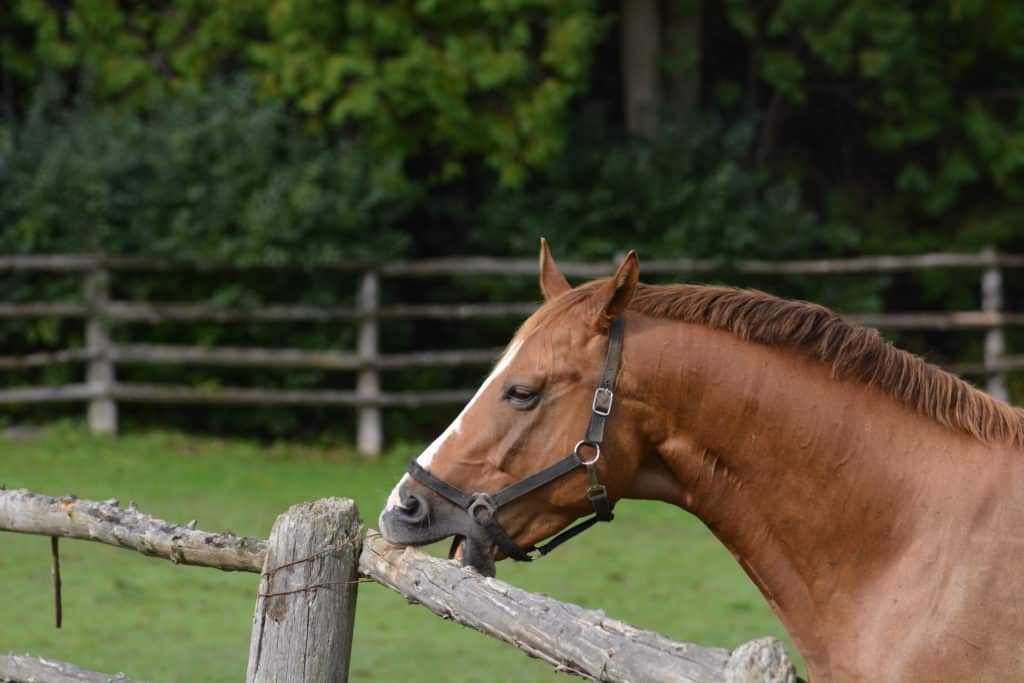Equine Health, Equine Lifestyle, Equine Training
What is Crib Biting in Horses? Causes & Solutions
Crib biting in horses is a compulsive repetitive behavioural disorder that’s most common in equines that spend a lot of time stabled. It can be quite alarming to see, especially for those glimpsing it for the first time, but what is crib biting in horses exactly? Is it harmful and should you prevent them from doing it?
What is crib biting in horses?
Also referred to as wind sucking, crib biting in horses is where they grab an object – typically either the stable door or fence – with their upper incisors then pull against it with an arched neck, and suck in a large amount of air into the upper part of the oesophagus. This will usually be paired with a characteristic grunting sound.
Interestingly, crib biting is known as one of the ‘oral stereotypies’ which are repetitive sequences of behaviour with no clear goal or function. This is also why the behaviour is not to be confused with wood chewing as this has a clear goal, chewing/ingesting the wood.
Why do horses crib bite?
Crib biting isn’t a behaviour seen in wild horses so it’s thought that it must be a vice that develops due to how domesticated horses are kept. According to Jonathan Wood Veterinary Surgeon, around 4.2% of domesticated horses crib bite and around 15 – 37% of all develop an oral stereotypy.
Some of the most common reasons why horses may crib bite are as follows:
• Boredom
• Lack of turnout
• Lack of socialisation
• Stress
• Digestive discomfort
Previously it was thought that crib biting in horses was a learned behaviour, but this doesn’t seem to be the case. There’s been numerous accounts of horses that crib living in close proximity to those that don’t, and it doesn’t appear to be “contagious”.
Is crib biting in horses dangerous?
Crib biting can be dangerous for your horse. There are several health risks that can be caused by the behavioural issue:
• Horses that crib are more likely to develop gastrointestinal issues
• Cribbers have a higher risk of colic
• It can wear down their upper incisors
• Cause the overdevelopment of neck muscles
• Lead to osteoarthritis of the hyoid (a small bone located in the throat)
• It can cause weight loss as some horses would rather crib than eat
On top of the health concerns, crib biting can also result in a lot of damage to your fences, stables and walls which can also pose a risk of injury.
How to stop crib biting in horses
It’s extremely difficult to stop crib biting in horses once they develop the behaviour and many vets and behaviourists suggest that it’s actually cruel to try and do so. Cribbing is seen as a coping mechanism so instead of trying to prevent them from doing it, it’s better to try and address the reason behind why they’re cribbing in the first place and find a solution based on that.
Here’s some of our tips on reducing cribbing in horses:
1. Reduce boredom and stress
Boredom and stress are two of the biggest reasons why horses crib. If your horse is stabled for a large part of their day, offer more turnout and if possible, do so in a herd or with another horse. If turn out isn’t possible, you can also try using stable toys to keep them mentally stimulated.
2. Re-evaluate your horse’s diet
Crib biting in horses can be caused by digestive discomfort, so it may be their way of telling you that their diet isn’t suitable. High levels of concentrated grain-based foods and not enough roughage can increase stomach acidity, so try switching to a low grain feed and ensure that roughage in the form of hay or grass is always available.
3. Try out regular exercise
Your horse may be crib biting because of too much unspent energy, so regularly exercising them may help to stop the behaviour from occurring too often. Try a combination of lunging, hacking, and schooling to prevent boredom, entertain their brain and expel excess energy.
A note on preventive measures
As it’s not recommended to stop horses from cribbing entirely, you should avoid the use of inhumane cribbing collars and electric ones as these can cause discomfort. Additionally, never use anti-crib surfaces such as metal boards as these can result in tooth damage and horses need their front teeth to be able to eat properly. Another issue that arises from prevention is that as horses have such a strong drive to crib, it can make them perform the action more after a period of not being able to.
As mentioned previously, it’s extremely important to find out the reason behind your horse’s cribbing as often, it’s just a symptom of another problem. If you’re worried about your horse and their health, always contact your vet.
Now you know what crib biting in horses is and how to reduce the behaviour. Looking for more advice on caring for your equine? Check out our 12 tips to keep your horse stress free, next.


